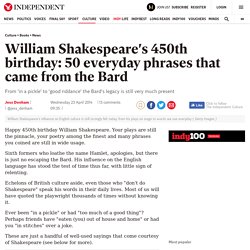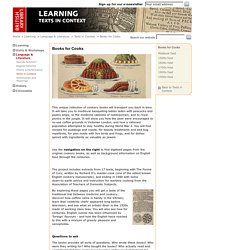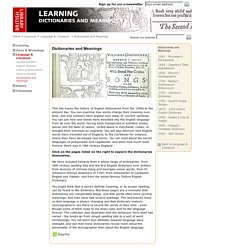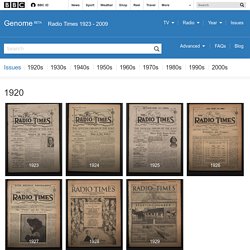

Erin McKean: Go ahead, make up new words! 100 words that define the First World War. The Oxford English Dictionary (OED) World War I timeline shows some of the ways in which the events of the First World War left their mark on the English language.

For example, the wet and muddy conditions of the first winter of trench warfare were evoked in the term Flanders mud (November 1914), while trench boots and trench coats (both December 1914) were invented to cope with these conditions. By early 1915 the physical and psychological effects of trench warfare were being felt: both trench foot and shell shock are first recorded in January 1915. War of the words: the global conflict that helped shape our language.
War: the mother of invention.

The phrase (a tweak of the proverb “necessity is the mother of invention”) refers to military technology. But a new book demonstrates how it is also true of language. The Word at War: World War Two in 100 Phrases is by Philip Gooden and Peter Lewis, who brought us the fascinating Idiomantics – a thrill-a-page tour of international idioms. William Shakespeare's 450th birthday: 50 everyday phrases that came from the Bard. Happy 450th birthday William Shakespeare.

Your plays are still the pinnacle, your poetry among the finest and many phrases you coined are still in wide usage. Sixth formers who loathe the name Hamlet, apologies, but there is just no escaping the Bard. His influence on the English language has stood the test of time thus far, with little sign of relenting. Echelons of British culture aside, even those who "don't do Shakespeare" speak his words in their daily lives. Most of us will have quoted the playwright thousands of times without knowing it. We’ll tell you what’s true. From 15p €0.18 $0.18 USD 0.27 a day, more exclusives, analysis and extras. Ever been "in a pickle" or had "too much of a good thing"?
These are just a handful of well-used sayings that come courtesy of Shakespeare (see below for more). It is often not clear whether a word or phrase was already in existence in Shakespeare's lifetime or if he invented it. 15 English words we stole from Arabic. Sign Up for Our free email newsletters You have zero interest in algebra, so you grab some alcohol — or maybe a coffee with extra sugar — sit on the sofa or mattress, eat an orange or some candy, and read a magazine or surf the web with Safari and Adobe.

And just like that, you've used a dozen words that came from Arabic. Books for Cooks. This unique collection of cookery books will transport you back in time.

It will take you to medieval banqueting tables laden with peacocks and pastry ships; to the medicine cabinets of noblewomen; and to royal picnics in the jungle. It will show you how the poor were encouraged to re-use coffee grounds in Victorian London, and how a rationed population attempted to stay healthy during World War 2. You will find recipes for puddings and roasts, for beauty treatments and bed bug repellents, for pies made with live birds and frogs, and for dishes spiced with ingredients as valuable as jewels. Dictionaries and Meanings. This site traces the history of English dictionaries from the 1500s to the present day.

You can examine how words change their meaning over time, and how scholars have argued over ideas of 'correct' spellings. You can see how new words have travelled into the English language from all over the world, having been transported in scholars' books, woven into the tales of sailors, carted about in merchants' crates, or brought from overseas by migrants. English Timeline. This interactive timeline allows you to explore the evolution of English language and literature, from the 11th century to the present day.

Scroll through decade by decade to investigate the richness and diversity of our poetry and prose, as well as the many social, cultural and political strands from which our language has been woven. The timeline includes a fascinating combination of texts: Anglo Saxon tales and medieval illuminations; iconic literary manuscripts and printed texts; as well as letters, newspapers, handbills, posters, charters, speeches and campaign leaflets. Launch the interactive Flash timeline above, or explore the collections within each of the centuries below.
Beowulf, Anglo Saxon monsters & more... Radio Times issues from 1923. This site contains the BBC listings information which the BBC printed in Radio Times between 1923 and 2009.

You can search the site for BBC programmes, people, dates and Radio Times editions. We hope it helps you find information about that long forgotten BBC programme, research a particular person or browse your own involvement with the BBC. Through the listings, you will also be able to use the Genome search function to find thousands of radio and TV programmes that are already available to view or listen to on the BBC website. There are more than 5 million programme listings in Genome. Should the Americanisation (or Americanization) of English worry us? “That’s what this nation has been built on, proud men.

Proud fucking warriors!” The 100 best nonfiction books: No 86 – A Dictionary of the English Language by Samuel Johnson (1755) British national self-confidence boomed throughout the 18th century, with that familiar mix of pride and insecurity.

Now, more than ever, the educated English reader needed a dictionary. In the new world of global trade and global warfare, a language that was becoming seeded throughout the first British empire required an authoritative act of definition by a vigorous and practical champion. Enter Dr Johnson. Samuel Johnson, born in Lichfield in 1709, was a pioneer who raised common sense to heights of genius, and a man of robust popular instincts whose watchwords were clarity, precision and simplicity.
139 Old Norse Words That Invaded The English Language. When I say “Old English” what comes to mind? The ornate, hard-to-read script? Reading Beowulf in your high school English class? The kinds of figurative compound nouns — or kennings — like “swan of blood” and “slaughter-dew” that have sustained heavy metal lyrics for decades? Old English, also known as Anglo-Saxon, was a language spoken by the Angles and the Saxons — the first Germanic tribes to settle the British Isles.
They were not the first inhabitants, as any Welsh or Gaelic speaker will tell you, but their language did form the basis for the Angle-ish we speak today. Culture - Why British English is full of silly-sounding words. “That wazzock dared to gazump me; I'm gobsmacked by this sticky wicket full of codswallop that's gone pear-shaped!” That sentence may not sound serious. But the situation it describes is. Translated into standard English, it would be something like “That idiot dared to offer more money for the house after my offer already had been accepted; I'm shocked by this tricky situation full of nonsense that's gone awry!” Shakespeare, this isn’t. Tit-Bits (with images, tweets) · DigiVictorian. A History of the English Language. The Double Vocabulary of English. A history of English ... in five words. The diverse origins of our global lingua franca. Caleb Roenigk/flickr, CC BY In 1582, Richard Mulcaster, headmaster of the Merchant Tailors’ school, wrote that “our English tung is of small reatch, it stretcheth no further than this Iland of ours”.
It didn’t stay that way. Today, English is spoken by more than a billion people all over the world. It is a colourful, vibrant and diverse tongue, that long has picked up words from the many languages with which its speakers have come into contact. 'English' Five words Shakespeare invented that weren't very successful at all - Books and Arts. On Quoting Shakespeare. Bernard Levin. Origins of English: "Our Language is at Present in a State of Anarchy" In the sixteenth and seventeenth centuries, England’s population grew rapidly: between 1550 and 1650, it doubled, reaching 5 million. Reflecting this growth a number of new words entered into English: ghetto (1611), suburban (1625), and dialect (1570s). Concerned about the apparent anarchy of the language and the lack of any standards regarding grammar, spelling, and pronunciation, the Royal Society set up a committee for improving the English language in 1664.
The model for the committee was the Academy which had been founded in France some 30 years earlier. Those who promoted this idea included the poet and critic John Dryden and polymath John Evelyn. With regard to the possible goals of this special committee, linguist David Crystal, in his delightful little book The Fight for English: How Language Pundits Ate, Shot, and Left, writes: “There could be a grammar and a dictionary, collections of dialect words, guides to spelling reform, translations to act as models of excellence.” History of English (combined)
English in time. Here you’ll find articles tracing the story of English from the Anglo-Saxons to the modern day. Expert overviews are combined with accounts of key episodes and themes to introduce you to the history of English. New articles will be published regularly in the coming months. c.700-c.1150 c.1150-1500. Nineteenth-century English—an overview. Word origins. Eccentric phrases of the English language - Country Life. From old English to modern English. The History of the English Language - Infographic. Major Dates and other Timelines. Borrowed words in English: tracing the changing patterns. C is for contrafibularity - Blackadder - BBC.
English language is loaded (or fou, or blotto) with ways to say 'drunk' Way back when English was Old English, between AD 600 and 1100, you were either "drunken" or "fordrunken" (very drunk) after a night of carousing. Even today, "drunken" will do for describing how you may be spending New Year's Eve. But you might also be "blinkered," "oiled" or "lit. " Quizlet: History of English.